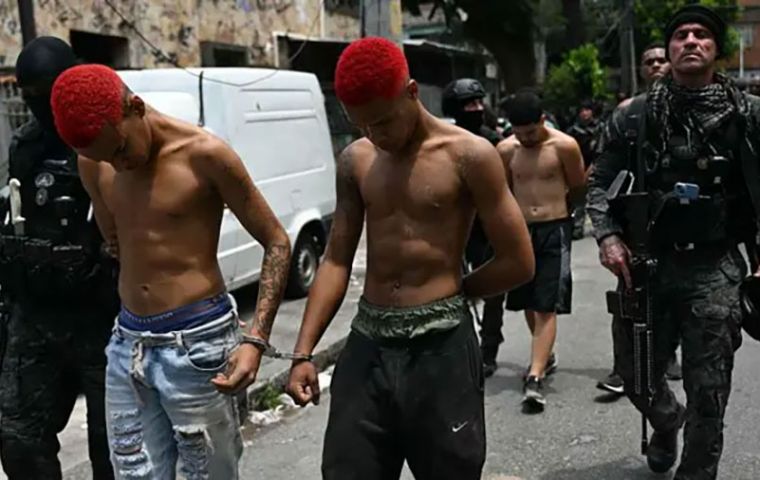MercoPress. South Atlantic News Agency
Indigenous communities in Peru say Comando Vermelho operates there
 Comando Vermelho's ramifications all over South America are still unfathomable
Comando Vermelho's ramifications all over South America are still unfathomable Indigenous communities in Peru's remote Yurúa district, on the border with Brazil, are raising a serious alarm over the increasing presence of members of the Brazilian criminal organization Comando Vermelho (Red Command) operating in their territory.
Organizations, such as the Interethnic Association for the Development of the Peruvian Rainforest (AIDESEP) and local groups, accuse the armed Brazilian group of exploiting a “state vacuum” to conduct illicit activities, including drug-trafficking, illegal logging, and other operations that threaten the safety and cultural integrity of Amazonian peoples.
Residents in the Yurúa and Breu river basins have reported numerous signs of organized crime activity, including small planes landing on improvised airstrips during early morning hours, the establishment of unfamiliar camps inside Indigenous reserves, and the movement of boats carrying cargo without government oversight.
These reports reinforce the perception that Comando Vermelho and allied criminal networks are operating with relative impunity in the region, which has expanded its reach into the Pasco and Huánuco regions, particularly the drug-trafficking hub of Puerto Inca.
Former Interior Minister Rubén Vargas warned that the criminal group is primarily interested in two businesses in Peru: cocaine and illegal mining, conducting operations mainly along the Amazon River route. In response to the growing threat, Indigenous organizations are demanding immediate and coordinated action from the Peruvian government.
Their key demands include maintaining a permanent security presence in the area, coordinating efforts between the Interior and Defense ministries, protecting vulnerable Indigenous leaders, promoting alternative development for local communities, and granting legal recognition to a “Transborder Indigenous Guard” to monitor the frontier.
The warnings come as authorities in Brazil suspect that senior members of Comando Vermelho may seek refuge in neighboring countries following a recent large-scale operation in Rio de Janeiro.
The regional scope of Comando Vermelho’s operations was underscored by a stunning discovery during one of Brazil's deadliest anti-drug operations: the seizure of a G3 rifle registered to the Peruvian Armed Forces during the Oct. 28 mega-operation in the Penha and Alemão favela complexes in Rio de Janeiro.
The coordinator of the Weapons and Explosives Control Division (CEFAI), Vinícius Domingos, confirmed that the massive arsenal seized included weapons of military use from several South American countries, including Venezuela, Brazil, Argentina, and Peru.
Domingos explained that most of these military-grade weapons enter Brazil via clandestine land routes that cross the Amazon, primarily from Paraguay. The operation resulted in the seizure of over US$2 million worth of guns.
The specific weapon, a German-made Heckler & Koch G3 rifle, has been a part of the Peruvian Armed Forces' historical arsenal since the 1960s. Its discovery in Brazil reinforces widespread concerns about the illegal trafficking of military weapons across South America and highlights the need for increased international cooperation and border control.




Top Comments
Disclaimer & comment rulesCommenting for this story is now closed.
If you have a Facebook account, become a fan and comment on our Facebook Page!